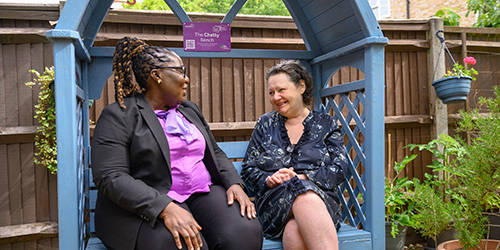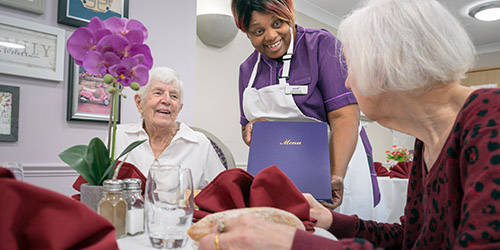- Home
- Guides & support
- Meeting the emotional needs of people living with dementia
Last reviewed 11 December 2025
Meeting the emotional needs of people living with dementia
Meeting the emotional needs of people living with dementia can be challenging.
Often a person can have trouble expressing themselves, which may lead to frustration as a result. The best thing to remember is that each person is an individual, and that all communication comes in many forms. How you respond in any situation should be personal to the individual – this is often called person-centred approach, or personally tailored care.
Approaching difficult conversations
 Communication can be difficult for both the person living with dementia and those caring.
Communication can be difficult for both the person living with dementia and those caring.
For example, someone could be asking to see a relative who is no longer alive, and it is hard to know how best to respond when you don’t want to upset or challenge the person who may be living with a different sense of reality. Telling the blatant truth could cause significant distress. Distracting them could also leave the person more confused and frustrated.
Focus on the emotions being expressed
In this difficult situation it helps to focus on the emotions being expressed rather than the facts of the situation, and acknowledge what the person might be feeling, for example, “I can see you look upset, can I sit with you for a while and you can tell me about your mum?”.
By showing that you recognise their emotions and exploring why they are asking for that relative, you can help them to feel supported and secure, allowing space and time to explore what you might be able to do to reassure and help. The better you know the person, the less complex this is to deal with.
Look for the meaning behind the words
In any circumstance, to begin to understand what that person might be saying, first try to consider the context of the question being asked. Look beyond what the person is saying to find the meaning behind the words and try to the identify the need they may be expressing.
Dementia communication techniques
To communicate effectively with someone who has dementia, you could look to validate their feelings. You could do this by using phrases like, "It sounds like you're feeling frustrated" or "I understand you miss your mum”. As well as this, active listening is a great way to show that you’re engaged. For this you could pay close attention, maintain eye contact, nod, and offer some verbal cues like “I see” to make them feel comfortable to continue speaking.
Talking about potentially upsetting topics could cause an individual to become distressed. If this happens, you could gently redirect them and offer a distraction like looking at photos, listening to music, or suggesting an activity they enjoy.
The power of non-verbal communication
 Communication goes beyond words, which is where non-verbal cues come into play. These cues include touch, such as gentle touching an arm or offering a hug, facial expressions, like smiling and giving a warm expression, and tone of voice, speaking in a calm tone to create a sense of security.
Communication goes beyond words, which is where non-verbal cues come into play. These cues include touch, such as gentle touching an arm or offering a hug, facial expressions, like smiling and giving a warm expression, and tone of voice, speaking in a calm tone to create a sense of security.
Managing feelings of distress
Sometimes, unmet emotional needs can manifest in feelings of distress. If someone seems distressed, it’s useful to try and identify the trigger of the behaviour. Is the person feeling overwhelmed, lost, or in physical discomfort?
If the person does become agitated, you could move with them to a different environment and offer them support through speaking calmly or offering them a familiar comfort object. If someone's distress is heightened and is causing potential risk at home, don't hesitate to seek professional help from a doctor or dementia care specialist. At Anchor, we offer dementia care options where we take a person-centred approach to empower our residents.
Look after yourself as well as your loved one
Caring for loved ones with dementia can be challenging as well as fulfilling, and it is important to have time to recharge and look after yourself too.
Lifestyles and routines for both you and the loved one you are caring for may change, and the person living with dementia may feel sad or frustrated by their symptoms. Always remember the individual and take time tot acknowledge and validate what they are feeling.
You can find more information and details of charities set up to provide support for people living with dementia, as well as their carers, in our Reframing Dementia guide here.
Related information about dementia
This website uses cookies which track activity so that you get the best possible experience. By continuing to use this website we will assume you are happy and cookies will be set. You can change your cookie settings at any time.












